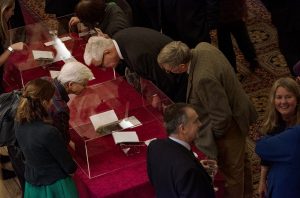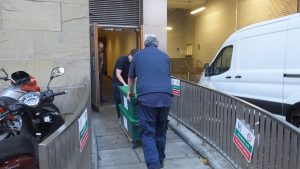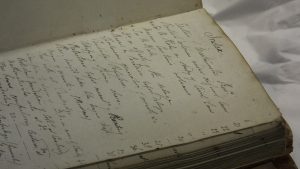Collection Curation
Since their arrival, the focus has been on a range of preliminary tasks to get the notebooks ready for digitisation, consultation and exhibition.
Exhibition

The first exhibition of Lyell’s notebooks
The first free public display of the Lyell collection is currently on at the University of Edinburgh’s Main Library on George Square, on the 6th floor in the Binks Exhibition Wall of the Centre for Research Collections (CRC). The volumes selected include a journal of a European tour of made by Lyell and his parents in 1818, an 1828 examination of the 1822 eruption of Vesuvius and an illustration of geology of Prosen Village (close to the Lyell family home at Kinnordy, Kirriemuir) in 1874. The exhibition also features an engraved portrait and a selection of geological specimens.
The exhibition also features a notebook which contains the description of shells sent to Lyell by Darwin, alongside the shells themselves. The shells and the geological specimens are part of a wider collection of around 100 stone artefacts (axes, spears and arrow heads), three meteorites, 25 fossils, 25 rocks. These were generously donated to the University in 1927 by the Lyell family (along with a significant collection of Lyell’s papers, now held in the CRC) and are held at the University’s Cockburn Geology Museum. Although the shells were already well known to us, finding documentation about them in the notebooks was a very exciting discovery.
The exhibition runs until 26 March.
Cataloguing
The notebooks fall into 5 series, the largest of these being Coll-203/A1, the principal scientific notebooks. The other series are Coll-204/A2 – travel journals, Coll-203/A3 – scientific journals / manuscript notes, Coll-203/A4 – Madeira and Canaries and Coll-203/A5 – Indexes. While full cataloguing will take some time and require to be resourced separately, skeletal catalogue entries for the first series has been created by repurposing a much earlier inventory. Some rudimentary entries have also been created for the volumes in the other series to allow them to be given unique identifiers, which are essential for managing digitisation, consultation and exhibition.
These catalogue records are not yet online but will be in the near future, once the notebooks are available for general consultation.
Conservation & Preservation

Notebooks shelved awaiting boxing
While primarily in pretty good condition a full conservation survey has been undertaken and work identified. In particular a good number the spine labels, which are an essential part of the materiality of the notebooks, are particularly fragile and will require some specific intervention.
Each notebook will require its own ‘book shoe’ after which they will then be boxed for efficient storage and retrieval. In the meantime, the notebooks have been temporarily shelved in sequence until this work can be carried out.
Digitisation
Two volumes have been selected as initial exemplars for digitisation. The first volume comes from the scientific notebooks and contains, “Geological notes and observation; Notes on modern causes”. The second is from scientific journals and contains some drafts of letters from Lyell to Charles Darwin.
A more ambitious plan of digitisation is currently being initiated, prioritising, in the first instance, the most physically robust volumes that require no or little intervention by a conservator.

Juliette Lichman working on Lyell digitisation assessment
Lyell in Context – New Post
The CRC is currently advertising an exciting new post: Project Archivist (Climate Change). This puts Lyell firmly in context, identifying his papers not solely as a record of his own life and work and of the history of his discipline but recognising its significance in terms of understanding our planet. Neither does Lyell stand in isolation. Crucial connections and interactions between him, his contemporaries and his successors run through a range of our collections and properly identifying and making these available for research is a high priority. Vital to understanding the Earth and its needs is understanding its history. This innovative post will scope out how Lyell’s papers and other collections here can play an important role.
As well as focussing on the collections, the Project Archivist will also have a responsibility to liaise with academic and other researchers and stakeholders and to establish and develop a cluster of research interest in and around the collections as a means of identifying the collaborative basis of future projects.
For further details on the post: https://www.vacancies.ed.ac.uk/ Vacancy Reference 050984
If you have any questions regarding the Lyell collections please contact in the first instance Rachel Hosker, Archives Manager and Deputy Head of Special Collections, at Rachel.Hosker@ed.ac.uk or to discuss the fundraising campaign or future funding needs; David McClay, Philanthropy Manager, Library & University Collections at david.mcclay@ed.ac.uk
 .
.
 The Friends of Edinburgh University Library played a vital role in helping to acquire the Charles Lyell notebooks. They celebrate that acquisition in the new issue of
The Friends of Edinburgh University Library played a vital role in helping to acquire the Charles Lyell notebooks. They celebrate that acquisition in the new issue of 
















